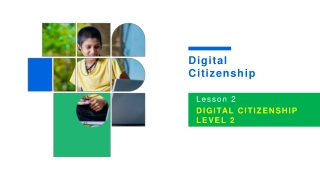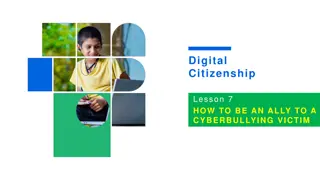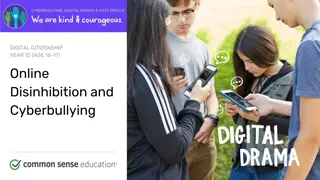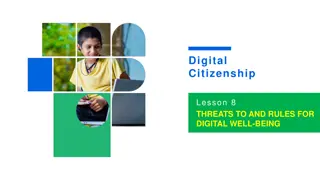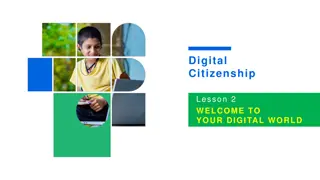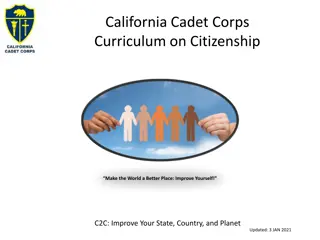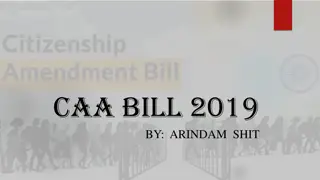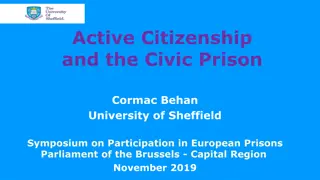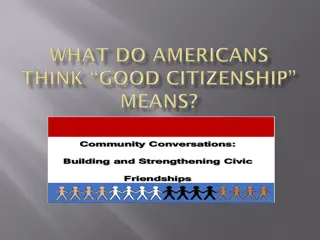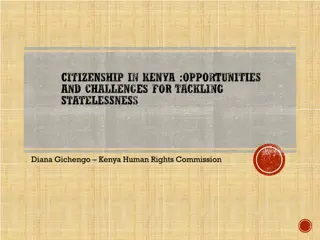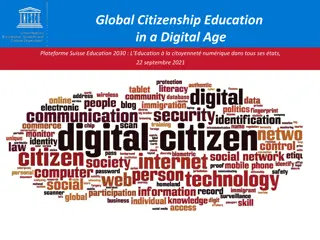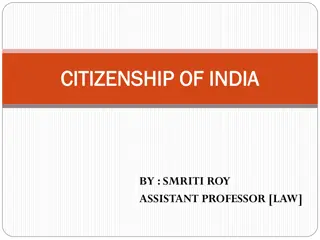Understanding Digital Citizenship: How You Present Yourself Online
This digital citizenship lesson emphasizes the importance of presenting oneself online responsibly. It covers topics such as internet etiquette, netiquette, the use of technology in personal lives, being an ethical digital citizen, and dealing with digital drama. By discussing these aspects, individuals can learn to navigate the digital world safely and respectfully.
Download Presentation

Please find below an Image/Link to download the presentation.
The content on the website is provided AS IS for your information and personal use only. It may not be sold, licensed, or shared on other websites without obtaining consent from the author. Download presentation by click this link. If you encounter any issues during the download, it is possible that the publisher has removed the file from their server.
E N D
Presentation Transcript
Digital Citizenship Lesson 4 HOW YOU PRESENT YOURSELF ONLINE
Level 1 | Digital Citizenship Do you think there are certain responsibilities that come with using the internet? What do you use the internet for? What does etiquette mean? Lesson 4: How You Present Yourself Online 02
Level 1 | Digital Citizenship What is Netiquette? What does the word etiquette mean to you? Lesson 4: How You Present Yourself Online 03
Level 1 | Digital Citizenship Netiquette Internet Etiquette Etiquette Netiquette or Digital Etiquette The customary code of polite behaviour in society or among members of a particular profession or group. The proper rules of behaviour while using technology devices and interacting with others online. Lesson 4: How You Present Yourself Online 04
Level 1 | Digital Citizenship What do you use technology for in your personal lives? Think! What other uses are there for technology in your personal lives? What do your family and friends use it for? Play games Do research for work Social network Can you name some social platforms? Lesson 4: How You Present Yourself Online 05
Level 1 | Digital Citizenship Digital Citizen A person who has the knowledge and skills to effectively use digital technologies to communicate with others. Lesson 4: How You Present Yourself Online 06
Level 1 | Digital Citizenship Why is it important to be ethical digital citizens? In order to safely communicate, learn, and create in an increasingly digital world. Lesson 4: How You Present Yourself Online 07
Level 1 | Digital Citizenship Dealing with Digital Drama Does the word drama have a positive or negative connotations? Lesson 4: How You Present Yourself Online 08
Level 1 | Digital Citizenship Digital Drama The everyday disputes among friends or online acquaintances. ccc Examples: Hurtful comments. Embarrassing photos. Inconsiderate rumours. Lesson 4: How You Present Yourself Online 09
Level 1 | Digital Citizenship A Good Digital Citizen Has Empathy Think! What are some questions you should ask yourself before posting or sending anything? How would the subject of my post feel about seeing it? Would I want my friends, parents or teachers to read this about me? Will this hurt the person s reputation? Would I say this to the person s face? How would I feel if someone had written that about me? Lesson 4: How You Present Yourself Online 010
Level 1 | Digital Citizenship Difference between Online and Face-to-face Communication THINK! What happens when you cannot see or hear the person you are interacting with? Facial expression Tone of voice cc Lesson 4: How You Present Yourself Online 011
Level 1 | Digital Citizenship Discussion: How to Deal with Digital Drama Lesson 4: How You Present Yourself Online 12
Level 1 | Digital Citizenship The Do s and Don ts of Online Communication What are internet trolls? cc cc Lesson 4: How You Present Yourself Online 013
Level 1 | Digital Citizenship Do Don t Be careful when posting on online message boards, blogs/vlogs, and discussion forums. (def) A lengthy exchange of angry or abusive messages between online users. Start flame wars, or succumb to the mean-spirited intentions of internet trolls. (def) A person who posts insincere or off-topic messages in an online community, with the intent of provoking negative feelings through argument. Lesson 4: How You Present Yourself Online 014
Level 1 | Digital Citizenship Fill in the Blanks on the Left with DO or DON T Communicate clearly by keeping your messages easy to read Do Spam your formal messages (for e.g., when replying to a teacher) with abbreviations and emoticons Don t Re-read and check everything you write before sending or posting Do Ask permission before posting anything about your friends Do Write in all capital letters Don t Lesson 4: How You Present Yourself Online 015
Level 1 | Digital Citizenship Quiz! 1) In which situation should you follow the rules of digital etiquette? a) Reading a text message from a friend b) Sending an email to your grandmother c) Picking the ringtone for your cell phone d) Sending a birthday card to your cousin 2) What is one difference between online and face-to-face communication? a) People tend to be more honest online b) Miscommunications happen more frequently face-to-face c) Online, you can t tell tone of voice. d) Body language is more important in online communication. Lesson 4: How You Present Yourself Online 016
Level 1 | Digital Citizenship Quiz! 3) What do internet trolls try to do? a) Quietly observe b) Start arguments c) Lead discussions d) Make friends 4) Why might people act meaner online than in person? a) They can stay anonymous b) Typing gives them time to consider what they say c) Most people have fewer friends online d) Social media sites encourage users to argue Lesson 4: How You Present Yourself Online 017
Level 1 | Digital Citizenship Activity: Interactive Digital Etiquette Worksheet Lesson 4: How You Present Yourself Online 018
Level 1 | Digital Citizenship A Good Digital Citizen Some Ideas How You Can Do That 1. Seek inspiration and follow feeds that inspire you Spreads goodness 2. Unfollow negativity Encourages positivity 3. Treat others kindly in the comments Provides support 4. Promote someone else s work 5. Be available to listen and offer support Lesson 4: How You Present Yourself Online 019
Class Activity Your Task: You have been appointed to design a Class Contract based on the do s and don ts of good online communication for your school. In your groups, discuss your own experiences and write down all the rules you should apply to online scenarios as a good digital citizen. Lesson 4: How You Present Yourself Online 020
Ready? Now, fill up this sheet. Lesson 4: How You Present Yourself Online 021


